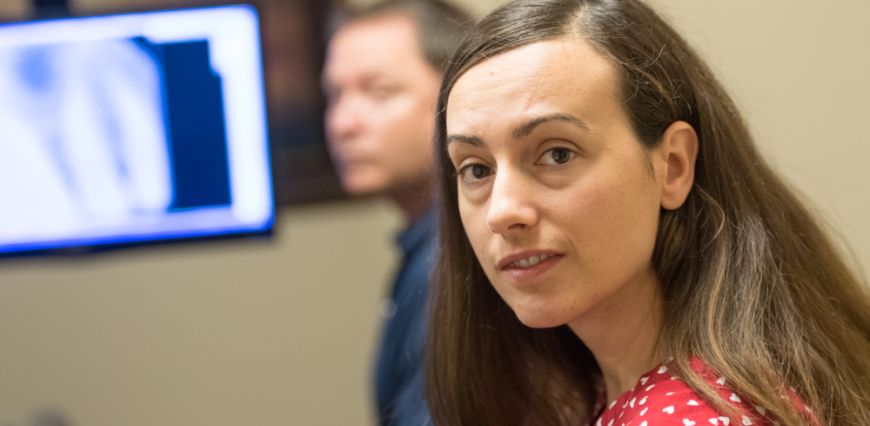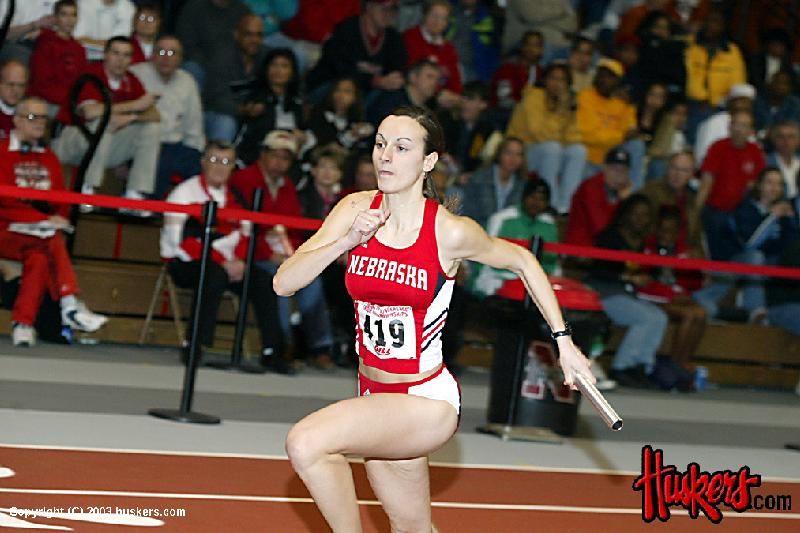
Dijana Elmejdoubi, a CSU graduate student in biomedical sciences and former Olympic runner, works with her mentor, Dr. David Jones, at Endodontics of the Rockies.
Dijana Elmejdoubi was 9 years old when she discovered the thrill of running. A professional coach visited her school in Tuzla, Bosnia, and her life changed forever when Dijana emerged as the fastest sprinter among all students at her school – boys and girls, in first through eighth grade.
“I fell in love with running from day one,” Elmejdoubi, now a Colorado State University graduate student, recalled. “I’ve also always loved science and thought I would become a doctor. But in Bosnia, school is strict and difficult, and sports are kept separate. It’s very hard to do well in both.”
Determined, Elmejdoubi began twice-daily training sessions at the track and maintained stellar grades; even a B would have disallowed her running. Her hard work paid off when Elmejdoubi went to the 2000 Olympic Games in Sydney, Australia, to compete for the Bosnia-Herzegovina National Team in the 400 meter dash.
“Competing in the Olympics is every athlete’s dream,” Elmejdoubi said. “Being there with top athletes from around the world was a big win for me.” It also led to her becoming a Division I athlete in the United States.
Today, Elmejdoubi is a student in CSU’s biomedical sciences one-year, non-thesis Master of Science degree program, also known as the MSpro in biomedical sciences. She is training for her next big event: becoming an endodontist, a dentist specializing in root canal treatment.
The Master of Science in biomedical sciences is a one-year degree program that does not require a thesis; it is also known as MSpro in biomedical sciences. The program prepares students for the rigors of professional school, the pursuit of a Ph.D., or entering a professional career in health or biotechnology. Students receive intensive cadaver-based human and animal dissection instruction; 80 percent of the program’s graduates are admitted to professional schools, such as medical, veterinary or dental school. For more information, visit our graduate programs webpage.
Setting the pace for success
After her Olympic debut, Elmejdoubi received a steady stream of track scholarship offers from U.S. schools. Since war-torn Bosnia didn’t have much to offer young people at the time, she jumped at the opportunity.
With no prior formal instruction in English, Elmejdoubi went on to excel in academics and track at Cowley Community College, the University of Nebraska-Lincoln, and the University of Southern Mississippi, where she graduated with a degree in biology and a minor in chemistry and set the record for the fastest time in the indoor 800 meter dash and the outdoor 400 and 800 meter dashes.
After college, she pursued a professional running career, which included competing in several world and European championships, while also gaining more than 10 years of professional experience in the pharmaceutical industry as a quality control chemist.
For Elmejdoubi, pursuing her passions in both science and running meant cultivating a great deal of discipline, focus and commitment. During her years as an undergraduate student, she took an average of 20 credit hours of tough science classes, while also working part-time and fitting in up to 30 hours of training and competing each week.

“It was tough, but I learned that consistency is key,” she said. “Sticking to a daily schedule, staying positive, and surrounding yourself with supportive and like-minded people is the key to success.”
A herniated disc injury kept her from the 2008 Olympic Games in Beijing. Before the 2012 Olympic Games in London, she met time requirements for the Bosnia-Herzegovina National Team, but wasn’t sent to compete for bureaucratic reasons.
“After that, I decided I was done,” Elmejdoubi said. As she hung up her competitive running shoes, Elmejdoubi met a friend’s father who worked as an endodontist. Intrigued, she shadowed him and discovered the career path she wanted to pursue.
“It gave me a different perspective on patient care and showed me a new way of helping people,” she said. “The process of learning about how dental problems happen, why they happen, and how to fix them is so rewarding for me. I love interacting with patients, too. This mentorship opened up my eyes to what the dental field has to offer and how much of a difference dental professionals can make in their community.”
Sprint to the finish
Elmejdoubi chose the MSpro program to gain the tools she needs to successfully enter dental school and later specialize in endodontics. This semester, in addition to taking a full course load, she’s also serving as a teaching assistant and working weekends as a quality control chemist for Tolmar Pharmaceuticals.
“Dijana is one of those students who goes beyond the requirements and pushes herself to be the best,” said Tod Clapp, assistant professor in the Department of Biomedical Sciences and director of its MSpro program. “Her work ethic, drive and perseverance are second to none.”
Elmejdoubi is thrilled to be immersed in intensive cadaver-based dissection instruction for the first time.
“This program has made me fall in love with science all over again,” she said. “All of the instructors are so passionate and inspiring. I know this experience will allow me to excel in dental school and my career, as well as help me become a more well-rounded person and scientist.”
Though she runs very little now, Elmejdoubi was forever shaped by what she learned from the track. “Running is what got me here,” she said. “I thank running for all of the success I’ve had in life.”